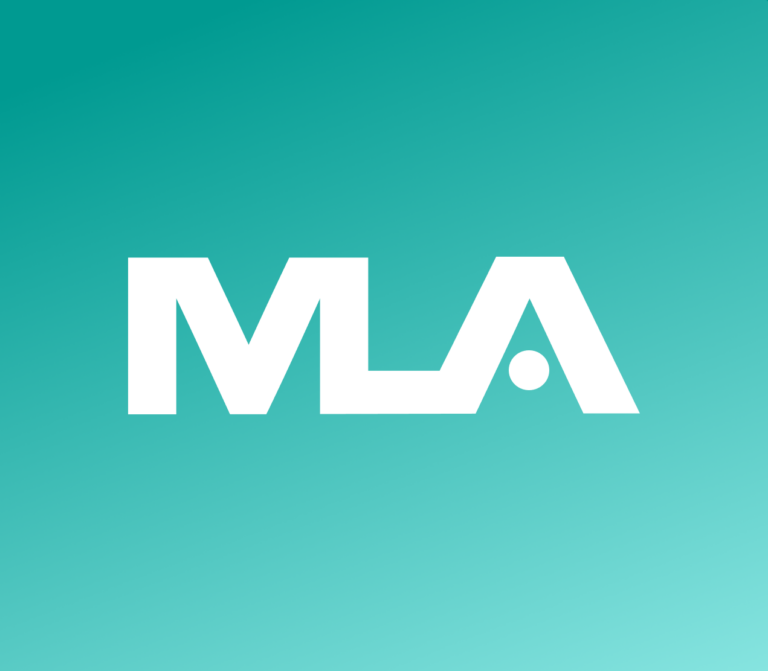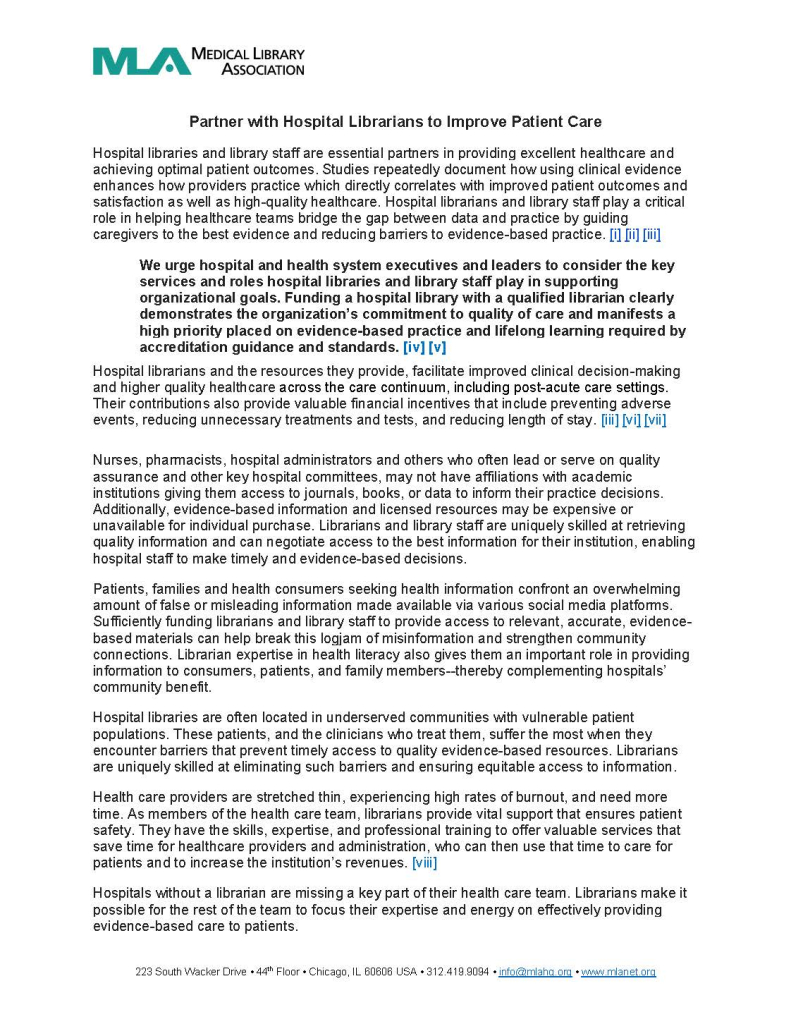
Aim For Excellence
Posted on: April 20, 2024
With Information from Medical Librarians
Improve the metrics you care about: your patients’ experience, the health of your community, and the per-person costs of healthcare.
Research demonstrates that librarian-led information services significantly contribute to your institution's mission.
PROVIDE BETTER CARE WITH INFORMATION FROM MEDICAL LIBRARIANS
Notable Research Data (see below for full references and links to studies)

- 39% of users of clinical librarian services reported a positive impact on quality of patient care; plus
- 45% reported that services ensured that interventions were based on best practice or current evidence;
- 25% reported improvement in patient and staff safety; and
- 16% reported reduced referral, tests, and readmissions. (Brettle, A, et.al., 2016)
- 86% of post-study participants surveyed rated their level of satisfaction with the just-in-time information service as having a positive impact on the care they provided to their patients (McGowan, J, et. al, 2008)
- 75% said that they definitely or probably handled patient care differently using information obtained through the library (Marshall, JG, et. al., 2014)
- 88% of respondents on the intervention team reported changing a treatment based on new information skills taught by a librarian, and 79% changed a treatment plan based on a search done by the librarian (Aitken, EM, et.al, 2011)

MAKE BETTER DECISIONS WITH INFORMATION FROM MEDICAL LIBRARIANS
Notable Research Data
- In one Veterans Administration (VA) study (8 hospitals) where clinical searches were conducted by librarians, health professionals said about search results:
- 95%—useful to direct patient care;
- 89%—reinforced a mode of treatment;
- 49%—influenced the advice to patient and family;
- 49%—altered the mode of treatment;
- 30%—influenced the choice of treatment;
- 30%—affected the choice of drugs;
- 16%—affected the choice of tests; and

- 14%—influenced the diagnosis. (Jemison, K, et. al., 2009)
- A study in 118 hospitals with more than 16,122 participants found that
- 95% reported that information provided by a librarian resulted in better informed clinical decisions
- 48% changed advice given to a patient;
- 33% changed the choice of drugs;
- 25% changed a diagnosis;
- 23% changed the choice of tests; and
- 12% changed post-hospital care or treatment as a result of using resources and services provided by librarians or the library (Marshall, JG, et. al., 2013)
- A systematic review of 28 studies demonstrated a range of impacts including:
- 37-97% impact on patient care;
- 10-31% impact on diagnosis;
- 20-51% change in choice of tests; and
- 27-45% change in choice of therapy (Weightman, AL, et.al., 2005)

AVOID ADVERSE EVENTS WITH INFORMATION FROM MEDICAL LIBRARIANS
Notable Research Data
- In a large study across more than 110 hospitals:
- 13% avoided misdiagnosis and adverse drug reactions;
- 12% reduced medication errors;
- 6% avoided patient mortality (Marshall, JG, et.al., 2013)
- Health care professionals reported benefits as a result of information from search requests in 8 Veterans Administration hospitals:
- 3% avoided adverse events or complications, while
- 8% avoided patient mortality (Jemison, K, et. al., 2009)

SAVE COSTS AND TIME; REDUCE LENGTH OF STAY WITH INFORMATION FROM MEDICAL LIBRARIANS
Notable Research Data
- Librarian contributions to morning reports led to
- a decrease in hospital length of stay of 2 days per case; and
- median
 hospital charges were reduced by $3,618 per case (Banks, DE., et. al., 2007)
hospital charges were reduced by $3,618 per case (Banks, DE., et. al., 2007)
- 85% of respondents reported that information provided by a librarian or through services provided by the library saved them time
- average time saved was 2.5 hours per person per case (Marshall, JG, et. al. 2013)
- 12% reported cost savings through reduced hospital length of stay (Brettle, A, et. al, 2016)
- A systematic review of 28 studies indicated a 10-19% reduction in length of patient stay (Weightman, AL, et.al., 2005)
- Librarians locate information more quickly and less expensively than clinicians, freeing up healthcare providers’ time so they could focus on patient care.
- On average, librarians provided responses to questions 6.61 minutes more quickly than health professionals;
- the average salary savings per search was $13.60 minimum for librarian searches. (McGowan, J, et. al, 2008)

CITED RESEARCH
Aitken, EM, Powelson, SE, Reaume, RD, & Ghali, WA (2011). Involving clinical librarians at the point of care: results of a controlled intervention (full text). Academic Medicine, 86(12), 1508-1512.
DOI: 10.1097/ACM.0b013e31823595cd
Banks, DE, Shi, R, Timm, DF, Christopher, KA, Duggar, DC, Comegys, M, & McLarty, J (2007). Decreased hospital length of stay associated with presentation of cases at morning report with librarian support (full text). Journal of the Medical Library Association, 95(4), 381-387.
DOI: 10.3163/1536-5050.95.4.381
Brettle, A., Maden, M. and Payne, C. (2016), The impact of clinical librarian services on patients and health care organizations (full text). Health Information and Libraries Journal, 33: 100–120.
DOI: 10.1111/hir.12136
Jemison, K, Poletti, E, Schneider, J, Clark, N, Stone, RD (2009), Measuring Return on Investment in VA Libraries (abstract). Journal of Hospital Librarianship, 9:379-390.
DOI: 10.1080/15323260903253803
Luther, J (2008). University investment in the library: What’s the return?:A case study at the University of Illinois at Urbana–Champaign (UIUC).
Marshall, JG, Morgan, JC, Thompson, CA, Wells, AL, (2014), Library and information services: impact on patient care quality (abstract; see your medical librarian for full article). International Journal of Health Care Quality Assurance, Vol. 27(8):672 – 683
DOI: 10.1108/IJHCQA-10-2013-0119
Marshall JG, Sollenberger J, Easterby-Gannett S, et al. The value of library and information services in patient care: results of a multisite study (full text). Journal of the Medical Library Association,101(1):38-46.
DOI: 10.3163/1536-5050.101.1.007
McGowan, J, Hogg, W, Campbell, C, & Rowan, M (2008), Just-in-time information improved decision-making in primary care: a randomized controlled trial (full text). PLoS One, 3(11), e3785.
DOI: 10.1371/journal.pone.0003785
Tenopir, C (2010). Measuring the Value of the Academic Library: Return on Investment and Other Value Measures (full text). The Serials Librarian, 58:39-48.
DOI: 10.1080/03615261003623005


Research & Statistics
Posted on: April 20, 2024
Studies
Patient care and clinical decision making is improved when health professionals use librarian-led information services and the library.
Do library services really have an impact on clinical decision making and improved patient care outcomes? How do physicians, residents, and nurses perceive the value of information they receive from the library and librarian?
Read these articles to learn how library services reduce hospital costs, length of stay, changes in diagnosis and clinical decision making and improved patient outcomes:
- Marshall JG, Sollenberger J, Easterby-Gannett S, Morgan LK, Klem ML Cavanaugh SK, Oliver KB, Thompson CA, Romanosky N, and Hunter S. The value of library and information services in patient care: results of a multisite study. J Med Libr Assoc. 2013 January; 101(1): 38–46. doi: 10.3163/1536-5050.101.1.007
See also the NN/LM MAR Value of Library Services website for regional results and summary reports. - Marshall JG. The impact of the hospital library on clinical decision making: the Rochester study. Bull Med Libr Assoc. 1992. Apr; 80(2):169–78.
- Klein MS, Ross FV, Adams DL, Gilbert CM. Effect of online literature searching on length of stay and patient-care costs. Acad Med 1994;69(6):489-495.
What did the 1987 “King Study” discover about the role of hospital library resources and services in hospital settings? Are these results still relevant today?
Read this landmark study and learn why 21st century researchers continue to develop studies built upon the “King Study”:
- King DN. The contribution of hospital library information services to clinical care: a study in eight hospitals. Bull Med Libr Assoc. 1987. Oct; 75(4):291–301.
What is the value of using library and information services to the hospital/health care institution? What kinds of information does management recognize as valid measures of the contributions librarians make to the bottom line (i.e., cost-based accounting, return on investment)?
Read these articles and learn the tools and resources in these studies could be used to communicate your value.
- Abels EG, Cogdill KW, and Zach L. Identifying and communicating the contributions of library and information services in hospitals and academic health sciences centers. J Med Libr Assoc. 2004. Jan; 92(1):46–55.
- Abels E.G, Codgill K.W, Zach L. The contributions of library and information services to hospitals and academic health sciences centers: a preliminary taxonomy. J Med Libr Assoc. 2002 Jul;90(3):276–84.
MLA Funded Research
MLA advances a culture where analysis and application of health information research is commonplace—where health information practitioners use the best available evidence when making a decision.
Since 2003, the association has funded health information research studies through the Donald A.B. Lindberg Research Fellowship. Lindberg fellows conduct studies that expand the research knowledge base by linking the information services provided by librarians to improved health care and advances in biomedical research.
The following published studies were funded through MLA’s Donald A.B. Lindberg Research Fellowship.
- 2010: Joanne Gard Marshall, Ph.D.
"The Value of Library and Information Services for Patient Care" - 2009: Sujin Kim
" A study of microscopic imaging description through captions published in academic biomedical journals - 2008: Mark Puterbaugh
" Evaluate a virtual 3-D environment as a tool to enhance student nursing and facilitate access to nursing, medical and healthcare information" - 2004: Timothy Patrick, Ph.D.
"Evidence-Based Information Retrieval in Bioinformatics" - 2003: Catherine Arnott Smith, Ph.D.
"Ten Thousand Questions: Understanding How Consumers Express Their Health Information Needs"
For a complete listing of Lindberg Fellows visit the Grants and Scholarship page.
Essential Partners in Healthcare Excellence
Posted on: April 20, 2024
MLA has developed resources for hospital and health care administrators highlighting the mission-critical roles that health sciences information professionals provide in healthcare settings.
MLA Statement Calling on Hospital and Health System Executives to Fund Libraries and Library Staff
Excerpt from the statement:
"Hospital and health system executives must take concrete action to support clinical and administrative staff, patients and their families, and communities by funding hospital library services led by a professional librarian. Working together, hospitals, health care systems, and librarians are positioned to provide the resources, access, and support your health care teams can depend upon to provide evidence-based practice services that will support healthy patient outcomes."

Co-Signing Organizations
- American Nurses Credentialing Center
- Association of Academic Health Sciences Libraries (AAHSL)
- Canadian Health Libraries Association/ Association des bibliothèques de la santé du Canada (CHLA/ABSC)
- Cleveland Clinic
- Colorado Council of Medical Librarians
- CyberTools for Libraries
- Memorial Sloan Kettering Cancer Center
- Metro Detroit Medical Library Group
- Michigan Health Sciences Libraries Association
- Midcontinental Chapter of the Medical Library Association
- NEJM Group
- National Jewish Health
- Ohio Health Sciences Library Association
- Pacific Northwest Chapter of the Medical Library Association
- Special Libraries Association (SLA)
If your organization is interested in co-signing this statement, please join us as an Essential Partner in Healthcare Excellence using the form below on this page or contact Maria Lopez, Manager of Executive Operations.
- Reach out to organizations you belong to that would be interested in using or supporting this critical document.
- Use the cover letter to contact the leadership of the organizations you think may provide support by endorsing the statement.
- Or, if you are already in contact with leadership of a hospital or national institution, please ask them to complete this form asking them to endorse the statement and be recognized as an Essential Partner in Healthcare Excellence.
- Add the statement title (and a link to this page) with your email signature. For example:
I support the MLA Statement: Partner With Your Hospital Librarian - Share your enthusiasm and support of this statement. Reach out to Maria Lopez at MLA and with other ideas you have, or to let us know how your efforts are going.
Essential Partners in Healthcare Excellence
Advocating for Authorship
Posted on: April 20, 2024
Recognizing Librarians and Information Professionals as Authors on Evidence Synthesis Publications
MLA members requested that the MLA Board of Directors address this issue with ICMJE and develop a statement that individual librarians can use to advocate for authorship.
The MLA Board has approved the Statement, “It’s Time to Acknowledge Authorship for Librarians and Information Professionals on Evidence Synthesis Publications," in response to this issue of librarians not receiving authorship on evidence synthesis publications, such as guidelines and systematic reviews. This statement was developed in collaboration with the members making the initial request and incorporated feedback from prior chairs of the Systematic Review and Research caucuses, among others.
MLA's hope is that this statement raises awareness about, and ultimately increases, librarian co-authorship on evidence synthesis publications. Librarians and information professionals are welcome to use the Statement to advocate for recognition when their authorship is being questioned.
The Canadian Health Libraries Association / Association des bibliothèques de la santé du Canada (CHLA/ABSC) has co-signed the statement, and MLA calls on other organizations and publications to indicate their endorsed support by completing the form below.
Download MLA's Authorship Statement (PDF)
Complete the form below to provide endorsed support of the statement.

